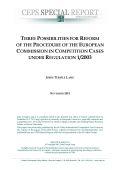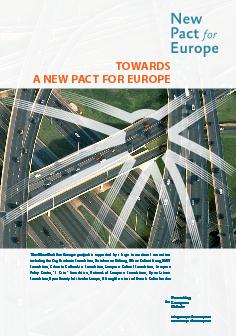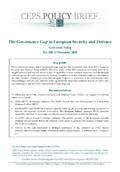Pelkmans, J. & Renda, A. (2014) “Does EU regulation hinder or stimulate innovation?“, Regulatory Policy, CEPS Special Reports, 19 November. One frequently hears the question posed in the title to this report, but there is little systematic analytical literature on the issue. Fragmented evidence or anecdotes dominate debates among EU regulatory decision-makers and in European business, insofar as there is a genuine debate at all. This CEPS Special Report …Read More
Is there (sustainable) growth in Greece?
Bastian, J. (2014) “Is there (sustainable) growth in Greece?“, MacroPolis: Greece in Perspective, 19 November. Greece finally exited its six-year long recession in the third quarter of 2014. The Hellenic Statistical Authority ELSTAT said that the economy grew by 0.7 percent in the third quarter (compared to the same quarter in 2013). The positive third quarter reading is the first after 24 consecutive quarters of negative GDP performance dating …Read More
Growth, inequality, and social welfare: Cross-country evidence
Dollar, D., Kleineberg, T. & Kraay, A. (2014) “Growth, inequality, and social welfare: Cross-country evidence“, VoxEU Organisation, 19 November. Concerns about inequality are at the forefront of many policy debates. While inequality has increased in many countries over the past few decades, in others it has decreased. This column uses data from 117 countries over the past four decades to investigate the importance of such changes in inequality, as …Read More
Erosion Or Exhaustion Of Democracy? The Challenge For Social Europe
Blühdorn, I. (2014) “Erosion Or Exhaustion Of Democracy? The Challenge For Social Europe“, Social Europe Journal, 18 Νοεμβρίου. Social Europe is caught between a rock and a hard place. It is supposed to restore confidence in democracy – which since the bailout of the failing banks and the ensuing politics of austerity can hardly be regarded as a plausible promise anymore and which, anyway, at EU-level is known primarily …Read More
Rethinking the Attractiveness of EU Labour Immigration Policies: Comparative perspectives on the EU, the US, Canada and beyond
Carrera, S., Guild, E. & Eisele, K. (2014) “Rethinking the Attractiveness of EU Labour Immigration Policies: Comparative perspectives on the EU, the US, Canada and beyond“, Justice and Home Affairs, CEPS Paperbacks, 13 November. Is Europe’s immigration policy attractive? One of the priorities driving current EU debates on labour immigration policies is the perceived need to boost Europe’s attractiveness vis-á-vis ‘talented’ and ‘highly skilled’ immigrants. The EU sees itself …Read More
The 2014 EU-wide bank stress test lacks credibility
Goldstein, M. (2014) “The 2014 EU-wide bank stress test lacks credibility“, VoxEU Organisation, 18 November. Results from last month’s EU-wide stress test are reassuring, especially for countries at Europe’s core. This column warns against a rosy interpretation. The test relies on risk-weighted measures of bank capital ratios that have been shown to be less predictive of bank failure than unweighted leverage ratios – a metric already adopted by the …Read More
Europe’s Bonds Are Unyielding
Gilbert, M. (2014) “Europe’s Bonds Are Unyielding“, Bloomberg View–European Economy, 14 November. With central bank interest rates at or near zero in many parts of the world, borrowing costs for governments and companies have plunged to record lows. In Europe, corporate bond yields are now so low that it’s hard to see how fixed-income investors will be able to make money. It’s also difficult to imagine that yet more cheap …Read More
Germany’s Secret Credit Addiction
Turner, A. (2014) “Germany’s Secret Credit Addiction“, Project Syndicate, 10 November. With recent data showing that German exports fell 5.8% from July to August, and that industrial production shrank by 4%, it has become clear that the country’s unsustainable credit-fueled expansion is ending. But frugal Germans typically do not see it that way. After all, German household and company debt has fallen as a share of GDP for 15 …Read More
New Pact for Europe: Second Report – Towards a New Pact for Europe
Emmanouilidis, Α. J. & Davis, J. (Ed.) New Pact for Europe: Second Report – Towards a New Pact for Europe, A publication of the King Baudouin Foundation, the Bertelsmann Stiftung and the European Policy Centre (EPC), October 2014. NEW PACT FOR EUROPE – PROJECT DESCRIPTION In 2012, a consortium of 11 European foundations initiated by the King Baudouin Foundation and Bertelsmann Stiftung, and supported by the European Policy …Read More
Was the ECB’s Comprehensive Assessment up to standard?
De Groen, W. P. (2014) “Was the ECB’s Comprehensive Assessment up to standard?“, Centre for European Policy Studies (CEPS), Policy Brief Νο. 325, 10 November. The Comprehensive Assessment conducted by the European Central Bank (ECB) represents a considerable step forward in enhancing transparency in euro-area banks’ balance sheets. The most notable progress since the previous European stress test has been the harmonisation of the definition of non-performing loans and …Read More








